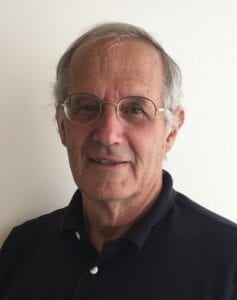Published: Monday, July 13, 2020, 12:00 p.m. U.S. Eastern Time
Media Contact: Kara Flynn, 301.634.8424 press@ashg.org

ROCKVILLE, MD – The American Society of Human Genetics (ASHG) has named Peter H. Byers, MD, as the 2020 recipient of the Victor A. McKusick Leadership Award. Dr. Byers is a Professor in the Department of Pathology and Department of Medicine (Division of Medical Genetics) at the University of Washington School of Medicine in Seattle, where he has spent his entire academic career (fellow in Medical Genetics and then a member of the faculty since 1977).
This award, which includes a plaque with a $10,000 prize, is named in honor of the late Victor A. McKusick, MD and is bestowed upon an individual who has exhibited exemplary leadership and vision in advancing the ASHG mission through the promotion and successful assimilation of genetics and genomics knowledge into the broader scientific community in areas ranging from science, medicine, public policy, and/or health.
“The Society recognizes the importance of Dr. Peter Byers’ creative research on the molecular pathogenesis of inherited disorders of connective tissue and its illumination of potential paths forward for understanding and treating disorders that affect collagen genes and the enzymes involved in the post-translational modification of collagens,” said ASHG President Anthony Wynshaw-Boris. “In addition, we recognize Dr. Byers’s leadership in nearly all facets of the American Society of Human Genetics, including as Editor of The American Journal of Human Genetics and as president of our society. His advice and counsel have been invaluable.”
“Dr. Byers’ research in connective tissue disorders is known internationally, but his leadership and mentoring roles in service to ASHG are just as distinguishing,” said Robin L. Bennett, MS, CGC, a member of ASHG’s Board of Directors and clinic manager of the Genetic Medicine Clinic and Center on Human Development and Disability at University of Washington Medical Center and a professor of Medicine (Medical Genetics) at the University of Washington.
Dr. Byers is a leading advocate for the training of future researchers, clinicians and molecular geneticists. Currently, he serves as the founding director of the University of Washington Collagen Diagnostic Laboratory (1984), one of the first academic diagnostic laboratories engaged in evaluation of people with heritable connective tissue disorders. Within this focus, he has trained many clinicians, graduate students, and fellows. He served as the Medical Director of the Genetic Medicine Clinic and Director of the Clinical Genetics fellowship at the University of Washington for more than a decade. His diagnostic laboratory at the University of Washington, along with another laboratory at Baylor, concurrently created positions for the first laboratory-based Genetic Counselors in the US. Due to this leadership, genetic counselors now serve in clinical laboratories across the U.S. and worldwide.
He remains a strong supporter of the genetic counseling profession both in the clinics and in the laboratories and serves on the advisory board for the newly accredited University of Washington Genetic Counseling Graduate Program.
Dr. Byer’s research, which grew directly from the idea that study of people with genetic conditions could lead to fundamental understanding of human genetics and biology, provided insights into collagen processing, folding and secretion, the identification of new genes involved in those processes and genetic connective tissue conditions, the role of parental mosaicism in unexpected sibling recurrence of dominant conditions to unaffected parents, some of the determinants of the outcome of splice site mutations, and the natural history of a number of disorders. In part because of these activities, he has served several of the family-based peer organizations (the Marfan Foundation, the Osteogenesis Imperfecta Foundation, and the Ehlers Danlos Society) in professional, medical, and genetic education for families. All these gave a genetic voice in these societies that helped families and restructured ways to think about the conditions.
He translated his clinical and research involvement into work with the formal aspects of the human genetics community. He was involved in the early days of the American Board of Medical Genetics and Genomics (ABMGG) and served on its Board of Directors and as its President. In that role, he worked to create the American Board of Pathology/American Board of Medical Genetics and Genomics joint Molecular Genetic Pathology Training Program. He was the Editor of the American Journal of Human Genetics from 1993 through 1999. During that time, he worked with the University of Chicago Press to create one of the first biological/medical journals that had very rapid electronic publication prior to print publications, which became the prevailing model for medical journals. He was a member of the Board of Directors of the ASHG and, subsequently, President of the Society.
He still thinks genetics is fun and says he can’t imagine another role in medicine. We welcome him as the 15th recipient of the Award.
Although ASHG made the decision to host the Society’s annual meeting virtually, the exact timing of the Victor A. McKusick Award Presentation is not yet known. An update will be provided as soon as information is available.
About the American Society of Human Genetics (ASHG)
Founded in 1948, the American Society of Human Genetics is the primary professional membership organization for human genetics specialists worldwide. Its nearly 8,000 members include researchers, academicians, clinicians, laboratory practice professionals, genetic counselors, nurses, and others with an interest in human genetics. The Society serves scientists, health professionals, and the public by providing forums to: (1) share research results through the ASHG Annual Meeting and in The American Journal of Human Genetics; (2) advance genetic research by advocating for research support; (3) educate current and future genetics professionals, health care providers, advocates, policymakers, educators, students, and the public about all aspects of human genetics; and (4) promote genetic services and support responsible social and scientific policies. For more information, visit: http://www.ashg.org.
6120 Executive Blvd, Suite 500 | Rockville, MD 20852 | 301.634.7300 | society@ashg.org | www.ashg.org
Connect with ASHG on Twitter (@GeneticsSociety) | Facebook | LinkedIn
